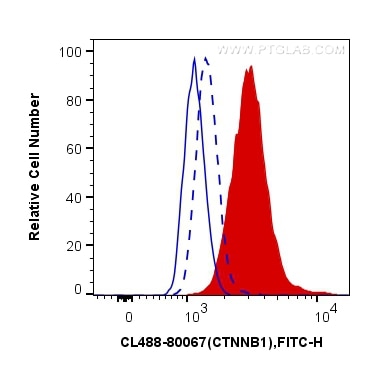Anticorps Recombinant de lapin anti-Phospho-Beta Catenin (Ser33)
Phospho-Beta Catenin (Ser33) Recombinant Antibody for FC (Intra)
Hôte / Isotype
Lapin / IgG
Réactivité testée
Humain
Applications
FC (Intra)
Conjugaison
CoraLite® Plus 488 Fluorescent Dye
CloneNo.
3K1
N° de cat : CL488-80067
Synonymes
Galerie de données de validation
Applications testées
| Résultats positifs en FC (Intra) | cellules PC-3 traitées à la calyculine A, cellules PC-3 |
Dilution recommandée
| Application | Dilution |
|---|---|
| Flow Cytometry (FC) (INTRA) | FC (INTRA) : 0.50 ug per 10^6 cells in a 100 µl suspension |
| It is recommended that this reagent should be titrated in each testing system to obtain optimal results. | |
| Sample-dependent, check data in validation data gallery | |
Informations sur le produit
CL488-80067 cible Phospho-Beta Catenin (Ser33) dans les applications de FC (Intra) et montre une réactivité avec des échantillons Humain
| Réactivité | Humain |
| Hôte / Isotype | Lapin / IgG |
| Clonalité | Recombinant |
| Type | Anticorps |
| Immunogène | Peptide |
| Nom complet | catenin (cadherin-associated protein), beta 1, 88kDa |
| Masse moléculaire calculée | 781 aa, 86 kDa |
| Poids moléculaire observé | 90 kDa |
| Numéro d’acquisition GenBank | BC058926 |
| Symbole du gène | Beta Catenin |
| Identification du gène (NCBI) | 1499 |
| Conjugaison | CoraLite® Plus 488 Fluorescent Dye |
| Excitation/Emission maxima wavelengths | 493 nm / 522 nm |
| Forme | Liquide |
| Méthode de purification | Purification par protéine A |
| Tampon de stockage | PBS with 50% glycerol, 0.05% Proclin300, 0.5% BSA |
| Conditions de stockage | Stocker à -20 °C. Éviter toute exposition à la lumière. Stable pendant un an après l'expédition. L'aliquotage n'est pas nécessaire pour le stockage à -20oC Les 20ul contiennent 0,1% de BSA. |
Informations générales
β-Catenin, also known as CTNNB1, is an evolutionarily conserved, multifunctional intracellular protein. β-Catenin was originally identified in cell adherens junctions (AJs) where it functions to bridge the cytoplasmic domain of cadherins to a-catenin and the actin cytoskeleton. Besides its essential role in the AJs, β-catenin is also a key downstream component of the canonical Wnt pathway that plays diverse and critical roles in embryonic development and adult tissue homeostasis. The Wnt/β-catenin pathway is also involved in the activation of other intracellular messengers such as calcium fluxes, JNK, and SRC kinases. Deregulation of β-catenin activity is associated with multiple diseases including cancers. (PMID: 22617422; 18334222). CK1 phosphorylates β-Catenin at Ser45. This phosphorylation event primes β-Catenin for subsequent phosphorylation by GSK-3β. GSK-3β destabilizes β-catenin by phosphorylating it at Ser33, Ser37, and Thr41. Mutations at these sites result in the stabilization of β-Catenin protein levels and have been found in many tumor cell lines .


